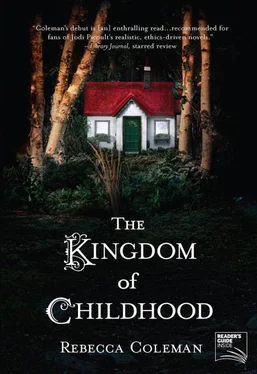Rebecca Coleman - The Kingdom of Childhood
Здесь есть возможность читать онлайн «Rebecca Coleman - The Kingdom of Childhood» весь текст электронной книги совершенно бесплатно (целиком полную версию без сокращений). В некоторых случаях можно слушать аудио, скачать через торрент в формате fb2 и присутствует краткое содержание. Город: Ontario, Год выпуска: 2011, ISBN: 2011, Издательство: MIRA Books, Жанр: Современная проза, на английском языке. Описание произведения, (предисловие) а так же отзывы посетителей доступны на портале библиотеки ЛибКат.
- Название:The Kingdom of Childhood
- Автор:
- Издательство:MIRA Books
- Жанр:
- Год:2011
- Город:Ontario
- ISBN:978-1-4592-1383-8
- Рейтинг книги:5 / 5. Голосов: 1
-
Избранное:Добавить в избранное
- Отзывы:
-
Ваша оценка:
- 100
- 1
- 2
- 3
- 4
- 5
The Kingdom of Childhood: краткое содержание, описание и аннотация
Предлагаем к чтению аннотацию, описание, краткое содержание или предисловие (зависит от того, что написал сам автор книги «The Kingdom of Childhood»). Если вы не нашли необходимую информацию о книге — напишите в комментариях, мы постараемся отыскать её.
was a semifinalist in the 2010 Amazon Breakthrough Novel Competition. An emotionally tense, increasingly chilling work of fiction set in the controversial Waldorf school community, it is equal parts enchanting and unsettling and is sure to be a much discussed and much-debated novel.
The Kingdom of Childhood — читать онлайн бесплатно полную книгу (весь текст) целиком
Ниже представлен текст книги, разбитый по страницам. Система сохранения места последней прочитанной страницы, позволяет с удобством читать онлайн бесплатно книгу «The Kingdom of Childhood», без необходимости каждый раз заново искать на чём Вы остановились. Поставьте закладку, и сможете в любой момент перейти на страницу, на которой закончили чтение.
Интервал:
Закладка:
“Why so sad?” Rudi asked her one day, on an occasion when he strode into the barn and found her already there, sitting and watching the cow, her paper and colored pencils discarded beside her. She had been using the Struwwelpeter book as a lap desk. The miserable boy stared up at them from the cover, bowlegged and sallow-cheeked, his clawlike hands spread uselessly. He appeared to be shrugging.
“I want my mother to come back.”
“She will. The doctors will make her better, and then there will be no more flick-flick-flick with the light, bop-bop with the cat bowl. You will see.”
Judy shook her head. “Every time they try to make it right, it goes wrong in a different way. She wasn’t like this back home. She was just neat, and liked things to be in order. Now she falls to pieces if they’re not. And she’s fat.”
Rudi laughed. “Fat?”
“Like somebody filled her full of air. She had to get all new clothes. My father says it’s from the medicine.”
The door creaked open, and Kirsten stepped in. “ Hallo, Judy,” she said, and gathered up the white enamel milk pans that sat in a row near the window. Their clatter broke the somber mood, but when she left, Judy pulled her legs up to her chest and wrapped her arms around them, pressing her forehead against her knees.
Rudi squatted down beside her and smiled. “Come with me,” he said.
She followed Rudi to a shed at the far corner of the property. When he opened the padlock, she looked back over her shoulder with an edge of nervousness. From the barn she could see her house, but from this shed she could see only the barn and Rudi’s house and that of his neighbors, an elderly couple whose names Judy did not know. Rudi swung open the door on its crumbling hinges and stepped inside. With hesitating steps Judy followed him past the threshold. The shed smelled of muddy soil and a haze of gasoline, stored in a dark red tin beside the old tractor. The air within the shed was cold, with only the narrowest slivers of light knifing off the rusted ends of garden tools. Rudi waved her inside and stepped into a corner.
“What is it?” she whispered.
The door thudded shut behind her. Rudi made a shushing noise and, with a crooked finger, gestured her toward him. She followed and sank to her knees beside him, hiking her skirt to keep it from the moist ground. A movement caught her eye; she pulled in her breath. And then Rudi carefully lifted from the quivering pile a tiny animal no larger than a chipmunk. He held it toward her in both palms.
“Go on, hold it,” he said in a quiet voice.
“Is it a mouse?”
“No. Igel. ”
“Eagle?”
His hands pushed toward her again. “Go on.”
She curled her fists against her stomach, afraid. It didn’t look like a bird, but in the small light it was difficult to see. Rudi extended his hands almost to her stomach and by reflex she reached out, not wanting this strange creature to crawl into her dress. At that moment he eased the animal into her hands and, sliding his hand beneath hers to support them, crouched behind her. With an arm on each of her sides, and both of his hands now beneath hers, her fears eased. The little creature snuffled, lifted its face, and she realized it was a hedgehog.
“Oh!” she cried. “Oh! Will it bite me?”
“No, no.” His breath was warm against her ear. “Very gentle. Very soft.”
She supposed he was giving her instructions. The animal itself was not very soft. Its tiny spines tickled her palm, and its squirming body seemed on the verge of sliding from her hands. But Rudy anticipated its small wiggles and kicks, tipping his hands beneath hers to ease it back to safety. Despite the need for quiet, she laughed aloud.
“Shhhhh,” he reminded her.
She looked up at his face and saw the peace that farmwork always laid over his features. When speaking of family or school, he was always animated, comical even; but the work of nature seemed to pull him back to the peace of the center, the windless sea that did not move.
She cupped the hedgehog in her hands and nestled back into Rudi’s chest. She felt the quiver of his ankles finding their balance, and smelled the hardworking scent of him, of the earth around roots and the bristled fur of animals, the copper tang of the tools he held, the rugged sweat of a grown man.
Easter passed and the daffodils bloomed, sending up green shoots suddenly to displace the crocuses that had endured the last snows. Judy was glad for the warmth that allowed her to leave her itchy tights at home, and walked home from the bus stop with her rucksack tight against her back, her skirt swinging gently against her knees. The broad fallow fields sprawled in all directions, their rugged brown soil glazed with rain; in the distance rose the smoky blue silhouette of the eastern Alps, Jagerkamp and Miesing, where her family had hiked the summer before. Through the vivid sky flew American fighter jets on practice exercises, engines whistling, leaving slim contrails in their wake. When she turned onto her own street she saw her father’s car in the driveway. Kirsten would be there, too, but Judy needed to change clothes before hurrying off to the barn, so the discomfort would have to be endured.
As she walked up the path toward the back door she ran her hand over the heads of the bright yellow daffodils that lined the walk; they bobbed and waved alongside her. She pushed open the door and stepped into the tidy living room with its maize carpet freshly vacuumed, brightened here and there by shards of sunlight from the spotless windows. The Supremes belted out a song on the radio, their voices as smooth and flawless as the ribbon of cream Kirsten poured from the pitcher onto her father’s strudel, and the whole house smelled cheerfully of pork and spiced apples, laced with a note of butter. Yet nobody seemed to be home. In the kitchen the laundry floated in the sink, unattended; next to the Dutch oven, the box of strike-anywhere matches had been left out. Judy was not allowed to touch them, but the story of Pauline had made her curious, and no one was around to see. She slid open the box and held one by its rough wooden stem, examining it closely. She struck it against the counter, the side of the stove, the metal cabinet, but it did not work. Finally she struck it against the wall and like magic it engulfed in flame. Judy smiled. It crackled so, it burned so clear, said the poem; and it was true. But Pauline had been a foolish girl who had not put it out in time, and so Judy puffed a breath of air against it. The fire vanished, and the kitchen filled with the smell of birthday wishes.
It was strange, but not unpleasant, to find the house so empty. She wandered down the hall, peering into each room: the spare bedroom her father used as an office, the bathroom, her own bedroom with its duvet fluffed high as a cloud. Standing in her doorway, she heard a muffled noise from the next room, a steady squeak like a window loose on its hinge. She turned the knob to her parents’ bedroom door, just as a fighter jet flew by overhead and drowned the creaking noise in its resonating sonic boom.
Later she would remember seeing nothing. Nothing at all: that she had turned the knob and seen nothing but the black vacuous space of blindness. Past the door the world ended. Past the door lay the incomprehensible dark.
The blackness had swallowed her father, and when he returned she recognized an impostor.
8
I dressed for College Fair night with a sense of dread. Scott had no desire to go, having already settled on the likely prospect of attending a school near Baltimore known more for its kegger parties than its academics. Yet we had no choice; it would look bad if either he or I skipped it, since I knew parents looked to our family for evidence that Waldorf kids could compete on a university level, and I needed to show up armed with enthusiastic stories about how well Maggie was doing at college. Three days had passed since the afternoon in the workshop, and in that time I saw Zach only through my classroom windows, coming and going from the parking lot. At times my mind grew nearly hysterical with questions I could not possibly answer. I feared his resentment and anger, his morning-after remorse, but most of all I was terrified he would run his mouth; even if he harbored no ill feelings, teenage boys were not legendary for their discretion. Surely he would tell somebody, and if one kid at Sylvania found out, they’d all know by lunchtime. Every time a colleague glanced at me, every time I heard my name called, my heart squeezed with fear. I had to talk to Zach, if only to emphasize to him that I was sorry, it had been a terrible mistake and it would never happen again as long as I lived.
Читать дальшеИнтервал:
Закладка:
Похожие книги на «The Kingdom of Childhood»
Представляем Вашему вниманию похожие книги на «The Kingdom of Childhood» списком для выбора. Мы отобрали схожую по названию и смыслу литературу в надежде предоставить читателям больше вариантов отыскать новые, интересные, ещё непрочитанные произведения.
Обсуждение, отзывы о книге «The Kingdom of Childhood» и просто собственные мнения читателей. Оставьте ваши комментарии, напишите, что Вы думаете о произведении, его смысле или главных героях. Укажите что конкретно понравилось, а что нет, и почему Вы так считаете.












